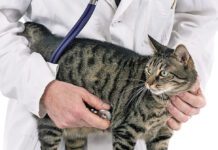It’s time for cats to get their day in research, says veterinary medicine genomics expert Leslie Lyons in a forum published recently in Trends in Genetics. Cats, she says, have the potential to be a valuable model organism for geneticists, as the feline genome is ordered similarly to that of humans.
“Using cats in research is really overlooked, since people don’t realize the advantages,” says Lyons, of the Department of Veterinary Medicine & Surgery at the University of Missouri. “The dog or mouse genome have rearranged chromosomes that are quite different than humans, but the domestic cat has genes that are about the same size as humans, as well as a genome that, like humans, is very organized and conserved.”
Lyons writes that cats could be an asset for helping researchers better understand our genetic “dark matter.” Cats have been found to have genetic diseases related to dysfunction of their genetic dark matter, making them a potential model organism for this type of research.
Cats could play a role in precision medicine for genetic diseases, in which instead of treating the symptoms researchers could fix the actual gene and what the gene does. For example, certain breeds of cats are prone to the genetic illness polycystic kidney disease, which also afflicts humans. Lyons says that if we could learn how to treat this disease in cats, we could, in theory, apply such technology to human diseases.
Leslie A. Lyons. Cats – telomere to telomere and nose to tail. Trends in Genetics, 2021; DOI: 10.1016/j.tig.2021.06.001. Science Daily.




